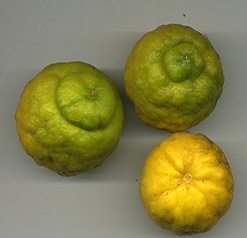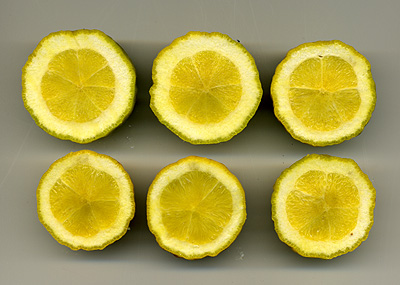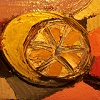| Author |
Message |
citrange
Site Admin


Joined: 24 Nov 2005
Posts: 589
Location: UK - 15 miles west of London
|
| Posted: Wed 21 Nov, 2012 9:30 am |
|
After a frosty spring, followed by a wet, sunless summer, my two mature Poncirus trifoliata trees are now dropping their fruits.
They are not completely ripe, with patches of green remaining.

Internally - as happens quite often in the UK climate - they are totally seedless.

Although not much use for producing seedling rootstocks, there is plenty of flesh and juice, should anyone want to make Poncirade!
Mike/Citrange |
|
| Back to top |
|
 |
Sanguinello
Gest
|
| Posted: Wed 21 Nov, 2012 10:05 am |
|
Hahaha ...
As a "fan" of english cooking, I think there will be some interessents there ...
Must be great to keep a stiff upper lip ..  |
|
| Back to top |
|
 |
GregMartin
Citruholic

Joined: 12 Jan 2011
Posts: 265
Location: southern Maine, zone 5/6
|
| Posted: Wed 21 Nov, 2012 10:21 am |
|

Any idea what specifically leads to fruit set with lack of seed development? |
|
| Back to top |
|
 |
Sanguinello
Gest
|
| Posted: Wed 21 Nov, 2012 11:22 am |
|
Too cold for bees and other pollinating insects. |
|
| Back to top |
|
 |
citrange
Site Admin


Joined: 24 Nov 2005
Posts: 589
Location: UK - 15 miles west of London
|
| Posted: Wed 21 Nov, 2012 11:57 am |
|
| Quote: | | Any idea what specifically leads to fruit set with lack of seed development? |
Botanically this process is called 'parthenocarpy' and many citrus species/varieties are capable of producing seedless fruit in this way. Navel Orange is always seedless, some mandarins remain seedless if not pollinated.
Plants that are not parthenocarpic will not set fruit if not pollinated. A google search will produce many scientific papers on the subject - many of which are beyond my understanding.
So Poncirus is parthenocarpic. I believe it is also self-compatible, because I have seen plants with seedy fruits that are remote from any others.
So what is the normal pollination method? As Sanguinello suggests, it is probably bees and insects - although it could also be simply the pollen being shed when ready and distributed by wind and gravity.
Even in cold springs we do still have some bees and insects flying around. I suspect it is the pollen itself that does not become active in cool and damp conditions , or that the flower stigma is not receptive. Perhaps the pollen cannot be spread if it is damp and thus not powdery enough.
Mike/Citrange |
|
| Back to top |
|
 |
GregMartin
Citruholic

Joined: 12 Jan 2011
Posts: 265
Location: southern Maine, zone 5/6
|
| Posted: Wed 21 Nov, 2012 12:56 pm |
|
Thanks Mike...I didn't realize Poncirus was parthenocarpic...cool!
Sorry for laughing with Sanguinello about English cooking...mental image of Sweeney Todd flashed through me head...opening scene in Mrs. Lovett's shop!!!  |
|
| Back to top |
|
 |
Sanguinello
Gest
|
| Posted: Wed 21 Nov, 2012 1:17 pm |
|
Yes, that damp cold pollen could not be spread by wind, but by bees etc for sure.
Some may fly around, but not far from stock/hide and therefore no pollination ... |
|
| Back to top |
|
 |
ilyaC
Citruholic


Joined: 04 Sep 2009
Posts: 274
Location: France, 40km South of Paris
|
| Posted: Wed 21 Nov, 2012 2:51 pm |
|
I guess it is something else, not a pollination problem.
My poncirus always produces plenty of fruits, all stuffed with mature seeds. I am sure that in many kilometers around there are no other trifoliata and it ends to flower well ahead my other citruses.
May be it is a property of your particular clone?
_________________
Best regards,
Ilya |
|
| Back to top |
|
 |
citrange
Site Admin


Joined: 24 Nov 2005
Posts: 589
Location: UK - 15 miles west of London
|
| Posted: Wed 21 Nov, 2012 4:46 pm |
|
I don't think it is a particular clone, as I have found this happens in some years at widely separated plants in the UK. Other years fruits do contain seeds.
I think we have quite significantly different weather patterns from your location south of Paris. Probably we are just on the edge of what this plant really requires to reproduce. |
|
| Back to top |
|
 |
Esmark78
Moderator

Joined: 30 Nov 2009
Posts: 69
Location: Copenhagen, Denmark Zone8
|
| Posted: Wed 21 Nov, 2012 5:26 pm |
|
same here in Copenhagen all Poncirus are loaded with seeds. We have trees in the Copenhagen botanical garden and the cemetery where H.C Andersen is buried in the part of Copenhagen called Nørrebro. Maybe allso other places around in the suburbs but all trees here have mature fruits in Nov-Dec loaded with seeds. |
|
| Back to top |
|
 |
ilyaC
Citruholic


Joined: 04 Sep 2009
Posts: 274
Location: France, 40km South of Paris
|
| Posted: Wed 21 Nov, 2012 5:41 pm |
|
| citrange wrote: |
I think we have quite significantly different weather patterns from your location south of Paris. Probably we are just on the edge of what this plant really requires to reproduce. |
This year it was a typical British spring  Temperatures of no more than 12-15°c in April-May; June-July were extremely wet and cold; August-September very dry but cold. I harvested several kilos of poncirus fruits all with seeds, also have smaller fruits from early August flowering, they sometime manage to survive through winter here. Temperatures of no more than 12-15°c in April-May; June-July were extremely wet and cold; August-September very dry but cold. I harvested several kilos of poncirus fruits all with seeds, also have smaller fruits from early August flowering, they sometime manage to survive through winter here.
Actually, in early spring when poncirus is flowering for the first time it is usually too cold for the real bees, but Bumblebees are abundant.
_________________
Best regards,
Ilya |
|
| Back to top |
|
 |
Sanguinello
Gest
|
| Posted: Wed 21 Nov, 2012 7:42 pm |
|
At all for you have african bees in England, which are extreme cold sensible.
Our bees fly all the time when it has more than 0 °.
Otherwise they never survived in the Alps ... |
|
| Back to top |
|
 |
Roberto
Citruholic

Joined: 02 Jun 2009
Posts: 132
Location: Vienna/Austria
|
| Posted: Mon 26 Nov, 2012 2:26 pm |
|
Sorry Sanguinello, but this is definitely wrong. Even bees in Austria do not leave their hive under 8°C and prefer temperatures above 10°C |
|
| Back to top |
|
 |
Sanguinello
Gest
|
| Posted: Mon 26 Nov, 2012 2:27 pm |
|
Ok, I will tell them next times I see them, that they do not exist ... |
|
| Back to top |
|
 |








